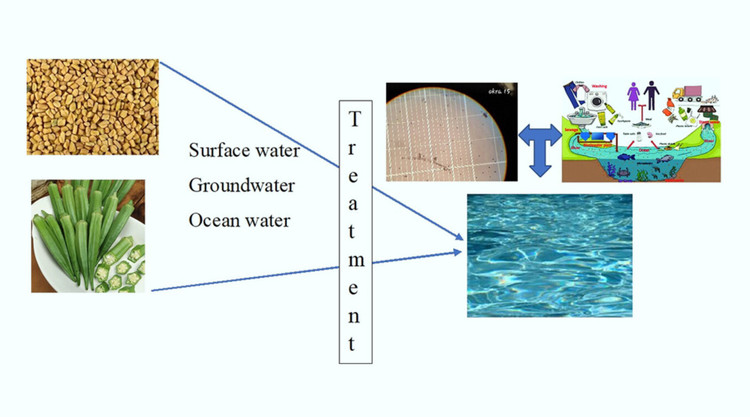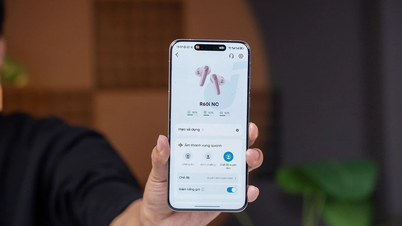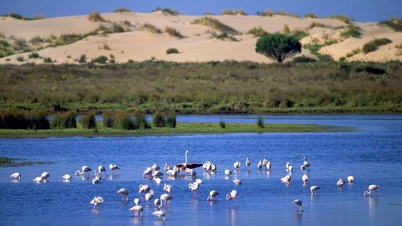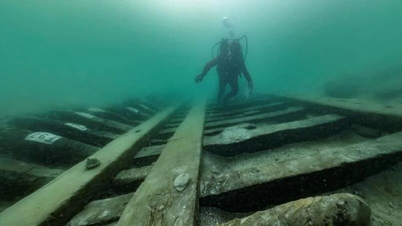Microplastics are increasingly present in human life, from oceans and rivers to drinking water, table salt, and even blood. Their extremely small size makes them almost invisible, but their impact on health is significant. Numerous studies warn of a link between microplastics and endocrine disorders, stroke, nerve damage, and even cancer.
Amidst the scientific community's search for more effective and safer solutions, a research team led by Rajani Srinivasan at Tarleton State University (Texas, USA) has published a remarkable finding: extracts from two familiar plants, okra and fenugreek, can form a bio-gel capable of removing up to 90% of microplastics from water.

The bioadhesive creation process is entirely natural and does not use chemicals. The research team soaked okra slices in water and ground fenugreek seeds to create a mucilaginous mixture. After leaving it overnight, the mixture was dried and ground into a fine powder containing a large amount of polysaccharide – a natural compound capable of binding microplastic particles.
With just one gram of powder per liter of water, the bio-gel can "gather" microplastic particles into clumps and push them to the bottom. Removing microplastics becomes simple without the need for specialized machinery or industrial chemicals. Test results show that fenugreek powder can remove up to 93% of microplastics after one hour of contact. Okra achieved 67% effectiveness. When both ingredients are combined, the effectiveness reaches 70% in just 30 minutes.
Not stopping at experiments with purified water supplemented with microplastics, the research team also conducted tests on real water samples in Texas, including seawater, groundwater, and freshwater. In seawater, okra showed the highest efficiency, removing about 80% of microplastics. In groundwater, fenugreek achieved an efficiency of 80–90%. For freshwater, a mixture of both achieved an efficiency of about 77%. This difference is explained by the different composition and size of microplastics in each type of water source.
One notable point is that this method does not cause secondary pollution. Meanwhile, polyacrylamide – a commonly used water treatment substance – is a synthetic polymer that can leave toxic residues if not properly treated. In contrast, extracts from okra and fenugreek are completely biodegradable, producing no new toxins after filtration. This is particularly important given the concerns surrounding the potential harm of "biodegradable" microplastics to the digestive system and internal organs.
This method is not only highly effective but also simple, inexpensive, and can be implemented immediately in areas lacking water treatment infrastructure. The extracted powder can be produced and packaged in dry form, making it easy to store and transport, suitable for remote communities or areas affected by plastic pollution.
This research builds upon the group's previous work on the ability to naturally filter water using readily available materials such as tamarind seeds. After optimizing the process with okra and fenugreek, the research team is continuing to refine the technology with the aim of large-scale production and application in domestic water treatment systems in many places.
With inexpensive raw materials, a simple process, and high processing efficiency, plant-based bioadhesives will become a viable solution in the global fight against microplastic pollution.
Source: https://khoahocdoisong.vn/bat-ngo-loai-thuc-vat-giup-loai-bo-toi-90-vi-nhua-trong-nuoc-post1551702.html



![[Photo] Closing Ceremony of the 10th Session of the 15th National Assembly](/_next/image?url=https%3A%2F%2Fvphoto.vietnam.vn%2Fthumb%2F1200x675%2Fvietnam%2Fresource%2FIMAGE%2F2025%2F12%2F11%2F1765448959967_image-1437-jpg.webp&w=3840&q=75)
![[Photo] Prime Minister Pham Minh Chinh holds a phone call with the CEO of Russia's Rosatom Corporation.](/_next/image?url=https%3A%2F%2Fvphoto.vietnam.vn%2Fthumb%2F1200x675%2Fvietnam%2Fresource%2FIMAGE%2F2025%2F12%2F11%2F1765464552365_dsc-5295-jpg.webp&w=3840&q=75)










































![[OFFICIAL] MISA GROUP ANNOUNCES ITS PIONEERING BRAND POSITIONING IN BUILDING AGENTIC AI FOR BUSINESSES, HOUSEHOLDS, AND THE GOVERNMENT](https://vphoto.vietnam.vn/thumb/402x226/vietnam/resource/IMAGE/2025/12/11/1765444754256_agentic-ai_postfb-scaled.png)



















































Comment (0)